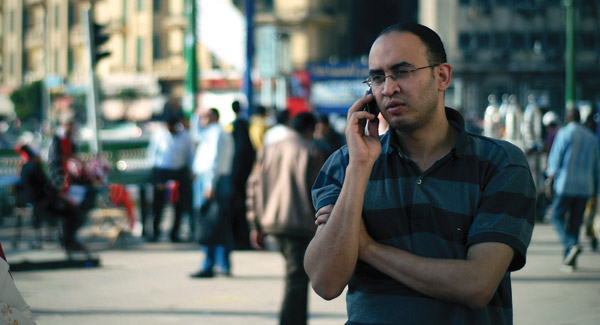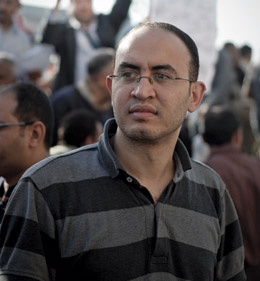Students, alumni and faculty connected to Egypt are elated, apprehensive — and hopeful — about what happens next
Story by Karen Gross / Photography by Faiz Dz

SJD student Ahmed Saleh in Egypt
As a small child in Alexandria, Egypt, Ahmed Saleh would comb the vast collection of books in the family home, and read whatever fell into his hands. His father, a practicing lawyer and avid reader, amassed a huge library which included countless texts about Egyptian law, crime, and punishment.
“One of the books that I couldn’t forget reading was about torture at the time of [President Gamal Abdel] Nasser,” Saleh remembers. “I was very young at the time, maybe just starting to read. And the descriptions are engraved in my mind until now.”
Those haunting images ignited a passion in Saleh that would ultimately take him to the centre of the Egyptian revolution, his hunger for a society free of torture and repression so consuming that he would risk his life for the cause.
A doctoral candidate at the Faculty of Law, Saleh had returned to Egypt to organize for former diplomat Mohamed ElBaradei, and to work on his dissertation. Politically active and extremely tech-savvy, he became one of five anonymous administrators of the ubiquitous Facebook page that inspired the January 25, 2011 uprising. Assuming the name of a young torture victim, the page was called “We are all Khaled Said.” When its founder, Google marketing executive Wael Ghonim, was arrested at a café in Cairo, Saleh took over — essentially managing the revolution from his computer.
 “During the revolution, when I received the admin password, I thought, ‘I don’t want to do that,’” he recalls. “It was very difficult to take this responsibility, seeing half a million people waiting for what I had to say.” Reluctant as he may have been, Saleh managed to not only keep the page running, but to revive popular support, which had begun to flag when the government cut the public’s Internet access and then began flooding the page with anti-revolutionary rhetoric.
“During the revolution, when I received the admin password, I thought, ‘I don’t want to do that,’” he recalls. “It was very difficult to take this responsibility, seeing half a million people waiting for what I had to say.” Reluctant as he may have been, Saleh managed to not only keep the page running, but to revive popular support, which had begun to flag when the government cut the public’s Internet access and then began flooding the page with anti-revolutionary rhetoric.
It would be too much, he says, to credit the Facebook page entirely with igniting such passion and determination among the Egyptian people. Saleh believes that honour belongs to the Tunisians, who set the stage first with their stunning popular success. But he does feel that the revolution would have been very different without it.
“It wouldn’t have happened as peacefully,” Saleh says. “It would have started with some clashes, people dying. But millions coming out, staying there until it was over — it wouldn’t have happened like this. It prevented all the forces from even thinking about a confrontation.”
Khaled Beydoun, LLM 2008, had been following the online chatter for some time and found himself in Cairo’s Tahrir Square almost by accident on January 25th, the day it all began. The Washington, D.C. consultant had been travelling in Lebanon on business, and passed through Egypt, where he was born, to see friends and family. Beydoun’s expectations were low. The many summers he’d spent visiting the country in his youth, among what he saw as an oppressed and largely apathetic people, left him unprepared for the powerful show he was about to witness.
“There was little dissent up until that day,” Beydoun recalls. “And in one fell swoop, that was all changed. People took to the street, marched, and it was as if they were letting out what they had built up inside for so many years.”
Beydoun had to leave Egypt the next day, but what he experienced on the 25th and the perseverance of Egyptians over the following weeks, left him a changed man. “I was resigned to the notion that change was not going to happen,” he says. “But after the revolution, it spurred this optimism, this rejuvenated perspective of the region that ‘Hey, if a revolution and considerable change could happen within 18 days, then a genuine sustainable democracy can be had in time.’”
Back in Washington, Beydoun and some friends established a website called FreeEgyptNow.org. The interest it sparked, not just among Egyptian-Americans, prompted them to widen their reach, creating DAWN, Democracy in the Arab World Now. The small group runs a growing media awareness effort, and aims to clear up what Beydoun calls common misperceptions about the Arab Middle East. In the past few months, he has been interviewed by the BBC, NBC, Al Jazeera, and Voice of America, among others.
“The people in the Arab world have the same needs and desires as people in the United States and in Canada,” he says. “They want the ability to speak freely, they want the ability to exercise their faith, to pursue jobs that are adequate and that provide meaningful resources for their families.”
Eventually, Beydoun hopes to do some advocacy and lobbying as well, but he says so far he is satisfied with his little group’s efforts, given their limited manpower and shoestring budget. “We’ve been able to actively address what’s taking place in the region,” Beydoun says, “while other established Arab American organizations have been silent.” He adds that DAWN has filled a void that left a lot of people frustrated.
First-year law student Eva Taché-Green was deeply affected as well. She spent three years in Egypt, mainly working with refugees, began learning Arabic, and developed many close friendships and contacts there. Taché-Green followed the first weeks of the revolution from Toronto, glued to the Internet.
“It was completely unexpected,” she remembers. “We were so caught off-guard. The fact that so many people went out that first day made me think something was finally going to happen.” Coincidentally, Taché-Green had planned a February vacation in Egypt months earlier, and she boarded her plane with a mixture of apprehension and anticipation. It was her taxi driver in Cairo who gave her the news.
President Hosni Mubarak had stepped down just 20 minutes earlier. “I didn’t believe it at first,” she says. “And then I was jubilant. I was laughing, I was crying, I was so incredibly happy. And then to drive through the streets it felt so surreal, like a dream. Sort of like a Hollywood version of a revolution. And to be there in the middle of it was just amazing.”
There were some dark moments, though, reminders that despite the euphoria Egypt had not transformed overnight. Taché-Green recalls one evening when she and a woman friend broke curfew, along with two Egyptian-Canadian doctors. “We were very badly treated by the military at the checkpoint,” she recalls, and says a commander tried to become inappropriate with the women. They were eventually released and Taché-Green downplays the incident, saying it wouldn’t have happened if she’d been off the streets by midnight.
Reflecting back on it now, Taché-Green believes it would be unrealistic to expect Egypt to produce a perfect democracy anytime soon. In fact, she expects the months ahead to be challenging, but remains very positive. “I like the fact that it’s messy as long as people stay involved,” she says. “And if people start becoming apathetic again, then I’m going to get worried.”
Mai Taha, a 26-year-old SJD candidate living in Toronto, is already worried. Born and raised in Cairo, Taha’s entire family is in Egypt, and they tell her the revolution is all people talk about. But now that Mubarak is gone, she’s wondering what all that talking will lead to. Picky debates over constitutional sub-amendments, and technical discussions about the upcoming elections, Taha believes, will not solve Egypt’s most pressing problems — massive poverty and social and economic inequality. “This is where it becomes difficult,” she says. “Because now you have a moment where Mubarak is gone. So what do we do next? This is basically the uncertainty that’s going on now.”
The key challenge, according to Mohammad Fadel, assistant professor in the Faculty of Law, is to keep Egyptians engaged, to mobilize people across social and economic boundaries and in every corner of the country. Fadel, an Egyptian-American, has close family ties in the country and has written and been interviewed widely on the subject. Free and fair elections are a first step, he says, but the real work lies in merging what are now conflicting interests into what he calls a social democratic coalition.
“If the wealthy or the upwardly mobile professional classes aren’t willing to subsidize a robust social welfare state,” Fadel warns, “then you’re going to have increasing labour unrest, increasing social unrest, and eventually people will be clamouring for a security state again.” Still, Fadel is more hopeful than fearful. The situation in Egypt has been so dire for so long, he says, there’s really no direction to move but forward. “What people need to see is that there’s going to be real accountability. The government’s going to be accountable to the people. Once that happens,” Fadel says, “then we need to start looking for the substantive laws they start passing.”
In Cairo, Ahmed Saleh, online revolutionary, is doing his best to maintain the momentum. Now a national field director for the presidential campaign of Mohamed ElBaradei, Saleh continues to help run the Facebook page that moved history. The administrators are no longer anonymous. Everyone knows who they are. And with those early descriptions of torture victims still seared in his mind, Saleh is absolutely committed to realizing the revolution’s promise. “I’m very optimistic,” he smiles, still seeming giddy with amazement. “I think we’re going to make it.”
People are even beginning to criticize the army — something unheard of just months ago. But Saleh is realistic too. Political change takes time, he says, and the time between now and September’s parliamentary elections is short. “Fifty years of prohibiting five people from gathering is not going to be resolved in five months,” he observes. “You’re not going to form a new political party that has candidates around the country in five months.”
In the meantime, Saleh says Egyptians are forging ahead, emboldened by their initial victory and invigorated by their newfound voice. “The police right now are under very close watch by the people,” he says. “If a policeman is holding someone, people will go and see what’s going on. If it’s legitimate, they will let him do it and if it’s not, they will not let him do it.”
No longer, he says, are the people of Egypt just waiting for things to happen. For the first time in decades they can see a path to something better. And wherever it leads will be up to them.



 “During the revolution, when I received the admin password, I thought, ‘I don’t want to do that,’” he recalls. “It was very difficult to take this responsibility, seeing half a million people waiting for what I had to say.” Reluctant as he may have been, Saleh managed to not only keep the page running, but to revive popular support, which had begun to flag when the government cut the public’s Internet access and then began flooding the page with anti-revolutionary rhetoric.
“During the revolution, when I received the admin password, I thought, ‘I don’t want to do that,’” he recalls. “It was very difficult to take this responsibility, seeing half a million people waiting for what I had to say.” Reluctant as he may have been, Saleh managed to not only keep the page running, but to revive popular support, which had begun to flag when the government cut the public’s Internet access and then began flooding the page with anti-revolutionary rhetoric.